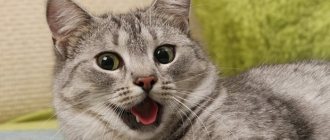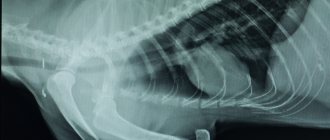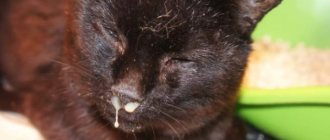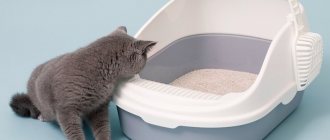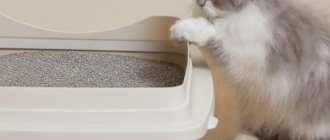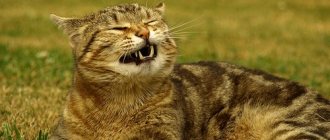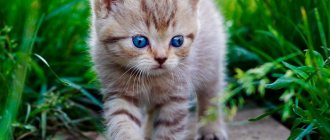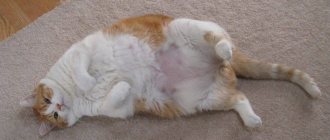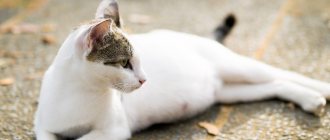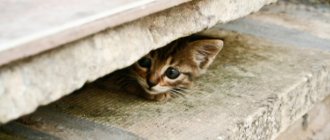The article was finalized and certified by a veterinarian: Dubovitsky Yuri Igorevich The article was updated: 03/27/2020
Pets, unfortunately, cannot tell us if they are feeling unwell. To recognize the development of any disease, owners have to focus on various indicators of the cat’s health: the condition of the cat’s coat, weight, activity level, appetite, stool, temperature, breathing. Our article will discuss respiratory problems, the causes of which may lie in the development of various diseases.
How cats breathe
The cat's respiratory system is not much different from the human one. First, air enters the larynx through the nostrils and pharynx, then it passes through the trachea and bronchi, and only then into the lungs. When you exhale, the remaining oxygen, nitrogen and carbon dioxide leave the body using the same organs.
Normally, adult cats take about thirty breaths in a minute. Baby kittens usually have about fifty breaths per minute. If the animal is healthy, its breathing is almost inaudible to the human ear, and the pectoral muscles evenly and smoothly lower and then rise again.
Respiratory process of a cat
The breathing of a living creature directly depends on its physical and psychological state. A healthy cat does not wheeze, breathes evenly, calmly, and inaudibly. If problems arise, she is unable to draw air into her lungs and her sighs become intermittent, as if coming from the “stomach.” There are a number of factors that influence the frequency of the process, in which there is no point in worrying too much:
- Stress due to rage, fear, joyful excitement - the frequency increases for a short time.
- Often a kitten wheezes when breathing if it has swallowed its own fur.
Also, do not forget why a kitten wheezes when breathing when he falls asleep soundly. This indicates complete relaxation. At the same time, his pulse and heart beats many times faster than that of an adult.
When heavy breathing is normal
It is incorrect to say that if a cat is breathing heavily, then some illness is to blame. So, our pets usually breathe heavily in the following cases:
- Fatigue
after active games or a long run; - Aggression
towards another unfriendly cat that is nearby; - Fear
(an animal may be frightened, for example, by the noise of a new vacuum cleaner, the roar of a gunshot, a trip in a car, etc.); - Pregnancy and lambing
; - Staying in a stuffy and hot room
.
Diagnosis of the condition
If the owner notices that the cat is breathing with difficulty, is very weak, apathetic and does not respond to anything, has severe injuries, has lost weight or has a serious illness (asthma, heart disease, etc.), it is necessary to urgently visit a veterinarian who has the necessary equipment and experience in providing assistance.
A weak, lethargic cat with trouble breathing should definitely be shown to a veterinary clinic.
During the trip, you need to check the cat’s breathing; if you can’t hear it, you can put a mirror against its nose or mouth. A foggy surface is evidence of breathing. You should also check the heartbeat in the chest and the pulse on the inside of the thigh. If breathing or heartbeat stops, you will have to start CPR yourself.
Heavy breathing as a sign of illness
Changes in breathing in and of themselves are not considered a disease. This is rather a sign of some serious illness. So, difficulty breathing can develop in a pet for the following reasons:
- Foreign object in the respiratory tract
- very often, when a cat begins to breathe heavily, the culprit is a pebble, twig or bone that is stuck in the respiratory organs. If something gets into the nasal passages, the cat will begin to sneeze heavily, clear snot will flow from its nose, its eyes will begin to water, and breathing problems may occur. When a foreign object gets into the throat, the cat, in addition to heavy breathing, experiences very strong hypersalivation, the unfortunate animal can gag, has difficulty swallowing, and breathes with its mouth open; - Infectious and non-infectious diseases of the respiratory system
- with rhinotracheitis, calcivirosis, pneumonia, bronchitis, laryngitis, rhinitis, tracheitis, asthma and other ailments of the respiratory system, cats breathe heavily with whistling or wheezing, body temperature rises, animals often catch air with their open mouths, sneeze. In case of infectious diseases, a cat may have yellow-green discharge from the nose and eyes, diarrhea and vomiting may develop, and ulcers may appear on the tongue. Almost always, respiratory diseases negatively affect the animal’s appetite and interest in games; - Pulmonary edema
is a similar ailment in which a cat’s breathing becomes heavy, and can be caused by many reasons: liver and kidney disease, allergies and anaphylactic shock, trauma, heart disease. With pulmonary edema, a cat may lie indifferently, breathing heavily with its stomach and gasping for air with its open mouth, and if you lean your ear to its chest, you can easily hear noises and gurgling. The purr does not eat, does not respond to the owner’s call, the animal’s mucous membranes become very pale or even bluish; - Lungworms
- if a cat lies and breathes heavily most of the time, refuses food, has a dry cough and severe shortness of breath even with minimal exertion, the culprit may be parasitic worms that have taken a liking to the lungs; - Heart failure
- with heart problems, the animal develops severe shortness of breath, the cat breathes heavily with its stomach, coughs, its mucous surfaces turn pale to a slight blue color. In some situations, foam begins to come out of the nose and mouth; - Poisoning
- if a purr accidentally swallows, for example, an alkali or an acid, she will probably have breathing problems, hypersalivation, convulsions, diarrhea and vomiting, pulse irregularities, trembling; - Oncology
– sometimes animals have cancer (both primary pathology and metastases) of the respiratory system (for example, the larynx or lungs, etc.). With neoplasms, the cat breathes heavily and opens its mouth slightly, often coughs (dry or with purulent-bloody sputum), wheezes, and swallows saliva often and with difficulty. The animal's voice may become distorted as the tumor develops. In addition, the purr eats little, loses weight, and sometimes develops a fever; - Anemia
- pallor of the mucous membranes, rapid or decreased pulse, heavy breathing, apathy and refusal to eat can symbolize that there are not enough red blood cells and hemoglobin in the blood; - Injuries to the spine, ribs, pectoral muscles, lungs
- with such problems, cats try not to use the chest when breathing, breathing from the stomach. Shortness of breath and pain are pronounced. Hematomas and even open wounds and abrasions can be found on the skin. The cat's pulse may become rapid and subsequently cause pain; - Hypoxia
– with oxygen deficiency, which can develop, for example, against the background of heart disease or severe fatigue, cats begin to breathe heavily, they may suffer from nausea (even vomiting), and motor coordination is impaired; - Obesity
– very often overweight cats breathe heavily even after minimal exercise. The symptoms of obesity, as they say, are obvious: the animal’s body weight is higher than normal, and the figure is more like a ball with legs.
Causes of rapid breathing
Frequent breathing in an animal can occur due to pathological and physiological reasons. If we are talking about hot weather or the postpartum period, the cat’s condition is quite justified: its body is experiencing a stressful situation. Over time, breathing will stabilize, so you just need to wait a while and help your pet as much as possible. But often frequent breathing can mean that the animal has some pathologies or diseases. In this case, you need to contact a veterinarian as soon as possible.
Cat with ascites
Pathological
Rapid breathing in a cat may indicate the presence of a pathology. It is worth paying attention to other symptoms in order to say with confidence what kind of disease the animal has. It is recommended that you contact your veterinarian first if your kitten begins to breathe rapidly.
The following are related to rapid breathing:
- blood diseases;
- pathologies of the heart, lungs;
- an increase in the size of internal organs due to the presence of certain pathologies;
- ascites;
- increase in abdominal pressure.
For your information! Lung disease can be considered the entry of a foreign organ into the respiratory tract, trachea or bronchi. But often a cat’s breathing becomes faster due to narrowing of the airways due to spasm or the presence of tumors. There may also be problems with the expansion of the lungs.
If breathing problems occur that are accompanied by additional symptoms, it is necessary to keep the cat under constant observation so that its condition can be assessed. You should not make a diagnosis and start treatment yourself, as this can harm your pet.
Physiological
Heavy breathing may occur in a mother cat who has just lambed. The animal’s body is experiencing stress at this moment, since childbirth is a difficult process. Do not be alarmed by the cat's shortness of breath at this moment, since breathing should soon stabilize.
Your pet may breathe quickly and stick out its tongue due to overheating. They don't have as many sweat glands as humans do, so they have to open their mouths to cool off. Also, rapid breathing in an active cat appears after physical activity. In this case, dilated pupils can also be observed.
Blue mucous membranes in a cat
If a cat is breathing frequently after surgery (even if it was castration or sterilization), then you should not panic right away: the animal is going through the process of recovery from medications. If gradually the depth and frequency of breathing begin to return to normal, then you should completely postpone the alarm.
However, there are cases when this process gets worse. It is necessary to check the animal's gums, lips and nose. If they acquire a bluish tint, you should immediately contact a veterinarian, since such symptoms are a complication of the respiratory or cardiovascular systems.
When worried, cats also begin to breathe heavily. It is necessary to look at how the animal looks: it flattens its ears and looks frightened, it hides or attacks in a stressful situation; a sick animal does not behave this way.
Note! Animals can dream too, so if your pet begins to breathe rapidly during this dream, there is no need to worry. Not everyone can sleep without dreams, but everyone will react to what happens in their dreams.
What to do if your cat is breathing heavily
So, there are quite a few reasons that can lead to respiratory problems in cats.
What to do if the cat is breathing heavily: self-medicate or rather take your pet to the veterinary clinic? First, you need to analyze whether heavy breathing is caused by harmless reasons (for example, a long hunt for a sparrow in the heat or fear of a car siren). If changes in breathing are understandable and short-term, there is no cause for concern. However, it is better to rush to the doctor if:
- The cat sticks out its tongue and breathes heavily for several hours or even days;
- In addition to breathing problems, the cat also exhibits other dangerous symptoms (for example, fever, seizures, refusal to eat, etc.).
During a visit to the clinic, it is important for the owner of a cat who has suddenly begun to breathe heavily to tell the doctor about all warning signs. To make a diagnosis, a veterinarian may order the animal to undergo a series of tests and studies (usually an X-ray, ultrasound, ECG, endoscopy of the nasopharynx, blood sampling, etc. are required). Treatment can be prescribed after a precise determination of the cause that led to respiratory problems.
What kind of help does a veterinarian provide?
Before the examination, the veterinarian always collects an anamnesis - detailed information about what preceded the condition, what other symptoms there are and in what conditions the cat is generally kept. Physiological causes are excluded.
An approximate diagram of further actions of a veterinary specialist (the course of manipulations may vary depending on the situation):
- thermometry (an important diagnostic sign that allows you to separate infectious pathologies from non-infectious ones);
- full clinical examination;
- taking blood samples for necessary laboratory tests;
- exclusion of worms;
- X-ray of the chest cavity (tumors, chest injuries, foreign objects are excluded);
- Ultrasound of the heart and abdominal cavity;
- thoracentesis (if necessary) - puncture of the chest wall - to determine the presence of pus, air, fluid, blood in the cavity, taking samples for additional research;
- making a diagnosis, prescribing therapeutic measures.
We recommend reading: How does poisoning manifest itself in a cat, what can poison it. Symptoms and signs of poisoning. poison, drugs. Treatment at home, medications.
List of drugs for drug therapy:
- anti-shock;
- affecting the respiratory center;
- bronchodilators (bronchodilators) and antispasmodics;
- painkillers;
- glycosides and cardiac;
- vasodilators;
- antipyretics;
- detoxification;
- blood substitutes, iron and/or saline infusion solutions.
Help in shock
Shock is a rapidly growing pathology, accompanied by a sharp decrease in blood pressure, general organopathy (failure of all organs and systems) and almost always rapid breathing. Antishock resuscitation is performed:
- adrenalin;
- infusion therapy to restore pressure;
- diuretics;
- glucocorticosteroids;
- analgesics;
- supporting the functioning of the respiratory center;
- correcting heart function.
The owner should never leave a cat's rapid breathing unattended, because... The respiratory rate does not always return to normal without external assistance. It’s better to be on the safe side than not have time to help your pet.
